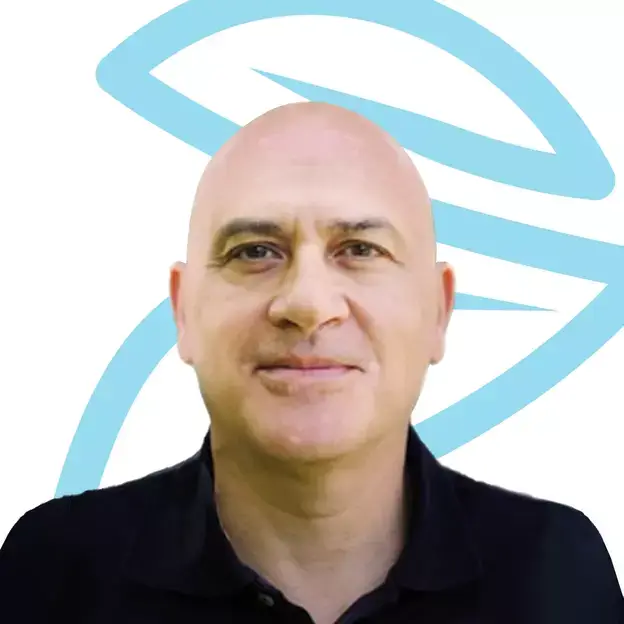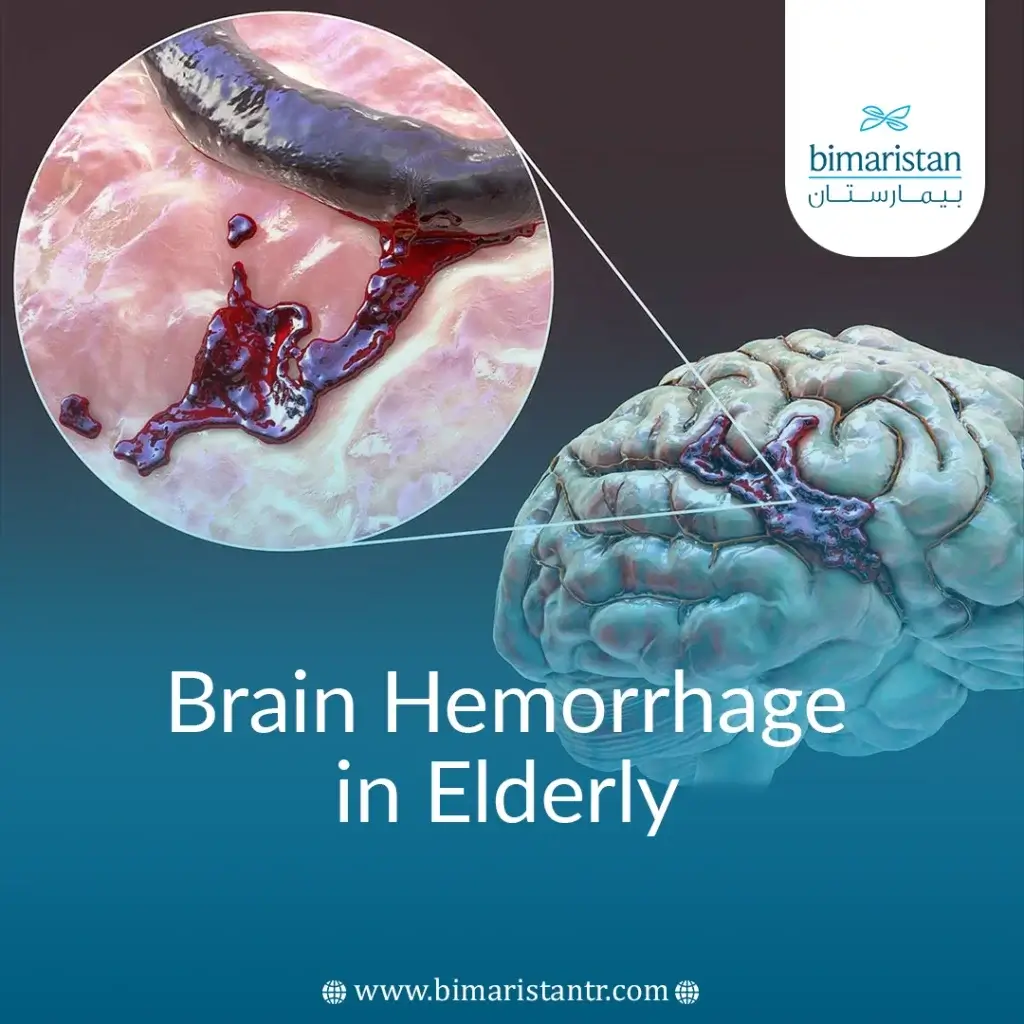Brain hemorrhage in elderly individuals is a type of stroke that occurs when a blood vessel in the brain bursts, leading to blood accumulation in the skull.
Internal bleeding in the brain leads to increased pressure inside the skull, resulting in decreased blood and oxygen supply to the brain. This can lead to the loss of brain cells and the emergence of severe symptoms, some of which may be irreversible. Therefore, brain hemorrhage in elderly individuals should be given special importance and treated as quickly as possible.
A patient may experience brain hemorrhage for several reasons. It could be caused by an accident or a severe blow to the head, causing a blood vessel in the brain to burst. Alternatively, brain hemorrhage in elderly people may be caused by existing diseases and risk factors that contribute to the rupture of a cerebral artery without the person experiencing any prior injury. Continue reading to learn more about the causes and symptoms of brain hemorrhage in elderly individuals and how to treat it properly.
What are the symptoms of brain hemorrhage in elderly people?
Some people may fear the possibility of internal bleeding in the brain without realizing it. Understanding the symptoms of brain hemorrhage can help detect it early before the condition progresses to cause life-threatening complications for the patient.
There are many signs and symptoms of brain hemorrhage, which vary from one patient to another depending on the location, severity, and nature of the injury. If the area of the brain responsible for vision is affected, the patient may experience visual symptoms (blurred vision). Similarly, if the area responsible for speech is affected, the patient may have difficulty speaking (speech impediment).
Although there are numerous symptoms of brain hemorrhage in older adults, and they vary, in most cases, at least one of the following symptoms will appear:
- Sudden, severe headache
- Muscle weakness and tingling sensation or numbness, which may lead to partial or complete paralysis on one side of the body (right or left)
- Nausea and vomiting
- Changes in vision (blurring or loss of vision, which may lead to blindness)
- Dizziness and confusion
- Difficulty swallowing food and chewing
- Impaired balance (cerebellar hemorrhage)
- Speech impediment or speaking incoherently
- Difficulty reading or writing
- Impaired sense of taste
- Irregular heartbeat and respiratory problems (brainstem hemorrhage)
- Changes in consciousness (drowsiness or coma)
- Seizures
Patients with brain hemorrhage in elderly individuals may experience the symptoms mentioned above. It is not necessary for all symptoms to be present; however, the sudden and recent appearance of even a single symptom can strongly indicate the possibility of a brain hemorrhage in elderly patients.
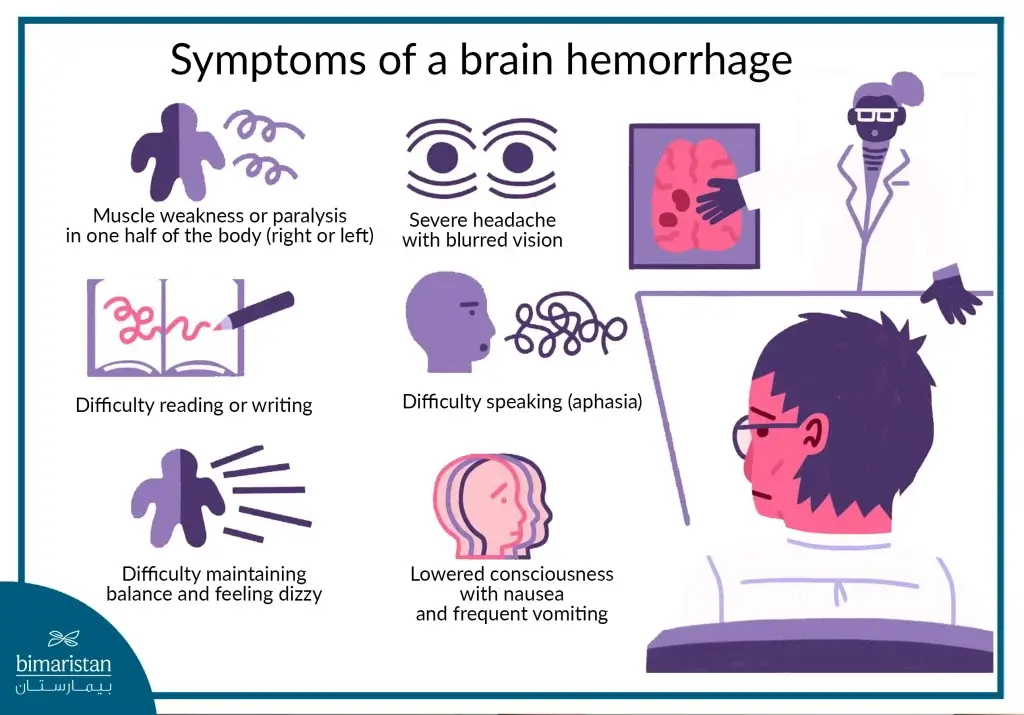
Brain hemorrhage in elderly people causes
Many causes and risk factors may lead to bleeding in the brain. These causes include:
Injuries and bruises on the skull
A violent blow to the head or a fall from a significant height can lead to the rupture of a blood vessel, resulting in a life-threatening brain hemorrhage in elderly individuals.
While a bruise on the skull does not always cause bleeding in the brain, it is possible for blood vessels around the brain (in the meninges) to rupture, leading to severe bleeding around the brain. This highlights the serious nature of brain hemorrhage in elderly patients. Learn more about internal bleeding in the head.
High blood pressure
When blood pressure rises uncontrollably without proper medication, excessive pressure on the vessel walls can cause a blood vessel in the brain to burst, leading to a brain hemorrhage in elderly individuals. High blood pressure has become one of the most common conditions in today’s world. To reduce the risk of a sudden brain hemorrhage in elderly patients, it is crucial to follow the prescribed blood pressure-lowering medications. You can read more about the causes of hypertension in women.
Brain aneurysm
A vascular malformation, also known as an “aneurysm,” is a balloon-like bulge in the wall of an artery. This bulge can burst at any moment, causing severe bleeding in the brain. Many people have aneurysms without knowing it. They usually do not cause any symptoms until they burst and cause internal bleeding. They are often caused by high blood pressure. You can read about endovascular coiling surgery used to treat aneurysms.
Stroke
A blood clot that forms in a blood vessel in the brain or travels from another location to a blood vessel in the brain can damage the vessel wall, causing blood to leak and cause a brain hemorrhage in adults. Stroke is usually classified as ischemic stroke (clot) or hemorrhagic stroke (bleeding in the brain), but a clot can sometimes cause a brain hemorrhage in adults. Read more about brain stroke.
Blood clotting disorders
Clotting disorders (blood clotting) are naturally implicated in some cases of brain hemorrhage, as are anticoagulant medications, which increase the risk of bleeding in the brain in older adults.
Some people suffer from diseases that make stopping bleeding and clotting more difficult for them than for others. In healthy individuals, when minor bleeding occurs, the human body stops this bleeding by clotting the blood. However, in patients with clotting disorders, the clotting process fails, and therefore, this minor bleeding does not stop and turns into severe bleeding.
This type of disease increases the risk of brain hemorrhage in elderly individuals, including hemophilia, sickle cell anemia, and leukemia.
Brain tumors
Benign or malignant tumors in the brain or brain may compress the tissues and structures of the brain, including the blood vessels, leading to the rupture of one of these vessels and the occurrence of brain hemorrhage in older adults or children.
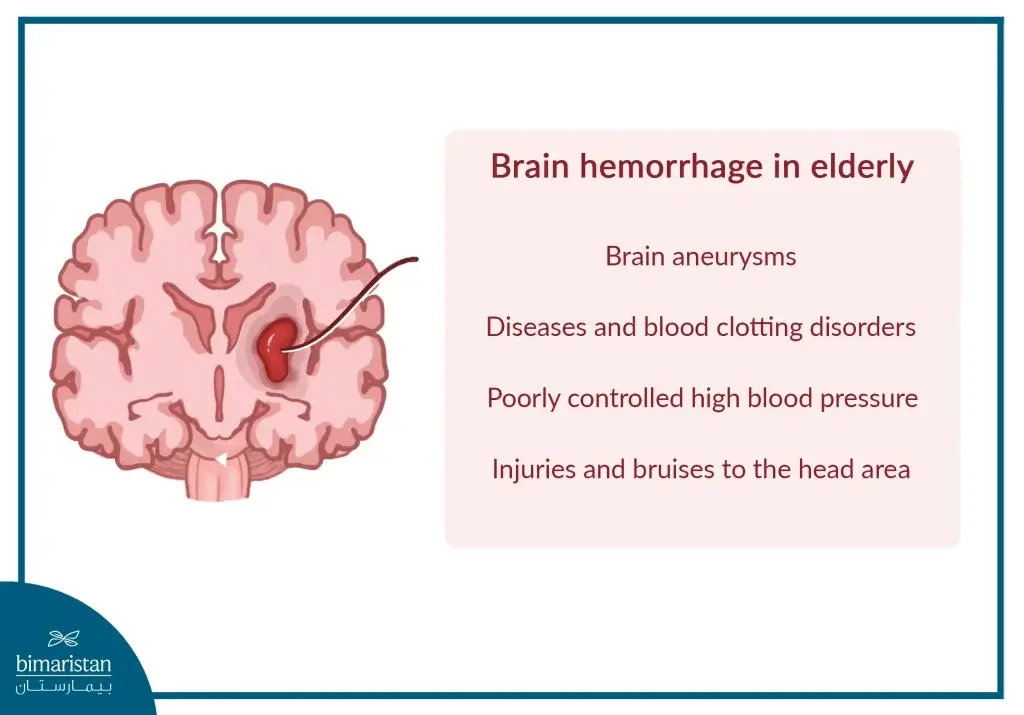
Diagnosis of brain hemorrhage in elderly individuals
Prompt diagnosis is crucial to avoid serious complications of brain hemorrhage. After detailed questioning about the symptoms and how they appeared (gradually or suddenly), the doctor performs a physical and neurological examination and then requests one of these tests:
Head X-rays
The CT scan (Computed Tomography) of the head is one of the most important methods used to detect and diagnose brain hemorrhage in older adults. This method allows for precisely determining the presence and location of brain bleeding. However, it may fail to detect brain hemorrhage in its early stages, whereas magnetic resonance imaging (MRI) can detect bleeding more quickly.
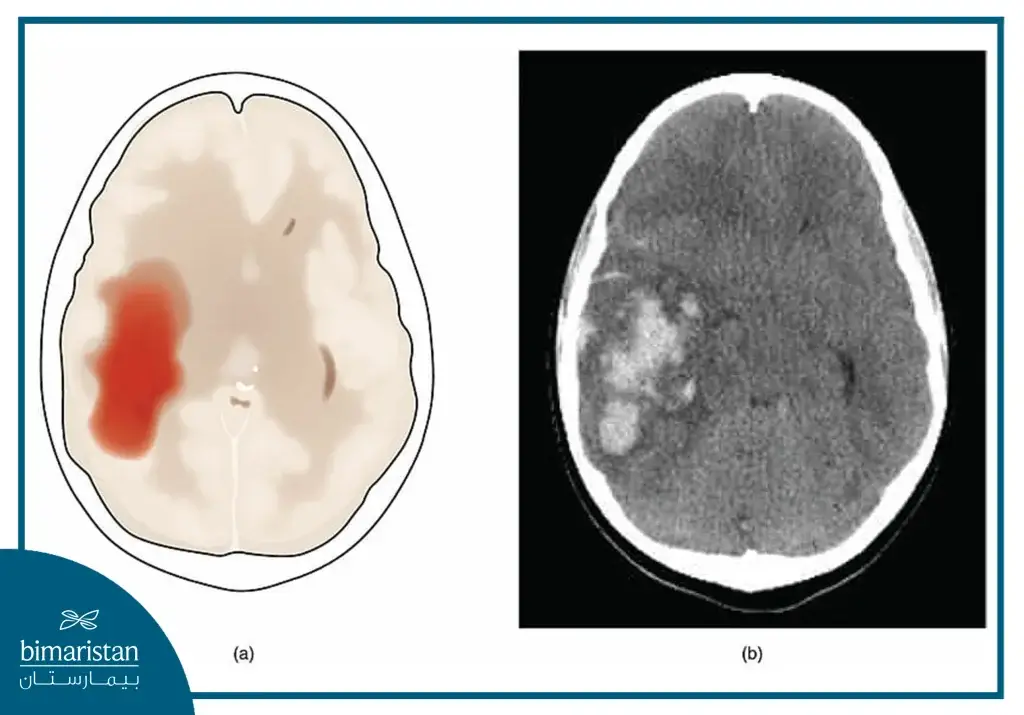
Cerebral angiography
This test allows the location of ruptured vessels and arteries in the brain to be identified by injecting a contrast agent and taking an X-ray image of the brain vessels. The image shows cerebral vascular abnormalities.
Treatment of brain hemorrhage in elderly people
After diagnosing brain hemorrhage and determining its location using imaging methods or by assessing the patient’s symptoms, the medical team begins to determine the appropriate treatment steps. Every case of brain hemorrhage is an emergency that must be transported to the hospital as quickly as possible.
In cases where a compressive hematoma forms in the brain, doctors may perform emergency surgery to relieve intracranial pressure. This procedure involves making a small hole in the skull and removing the hematoma through the hole. In severe bleeding cases, craniotomy may be the best option.
Modern treatments may reduce tension inside the head in some cases of brain hemorrhage in older adults. One such treatment is Endoscopic Third Ventriculostomy, which involves making a small hole in the third ventricle of the brain to allow drainage of cerebrospinal fluid and relieve cranial pressure.
After overcoming the danger phase and controlling brain hemorrhage in older adults, the patient’s risk factors can be treated to prevent another brain hemorrhage. These measures include:
- Controlling high blood pressure
- Undergoing surgery to remove cerebral vascular malformations
- Managing unruptured cerebral aneurysms through surgical clipping to prevent them from growing larger and reducing the risk of rupture
- Feeding a person who is unable to chew or swallow by placing a naso-oral feeding tube or through an intravenous (IV) line
- Prescribing pain relievers to alleviate symptoms
Brain hemorrhage in elderly individuals can pose a looming threat to the patient’s life if treatment is delayed. It manifests with many sudden symptoms and signs, such as severe headache, visual disturbances, difficulty speaking, weakness, or paralysis on one side of the body (right or left). Immediate treatment is essential in all cases of brain hemorrhage, and you should not hesitate to consult your doctor if you notice any symptoms or signs of injury.
Sources:
